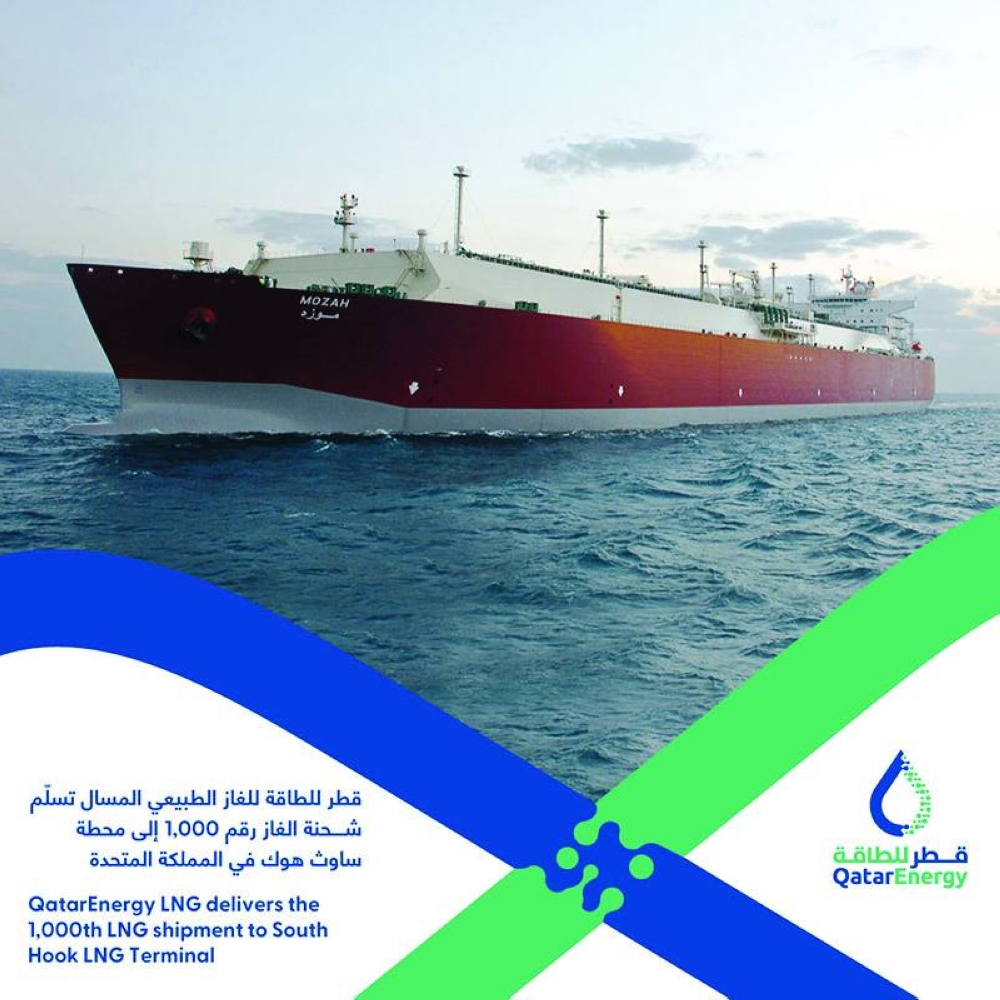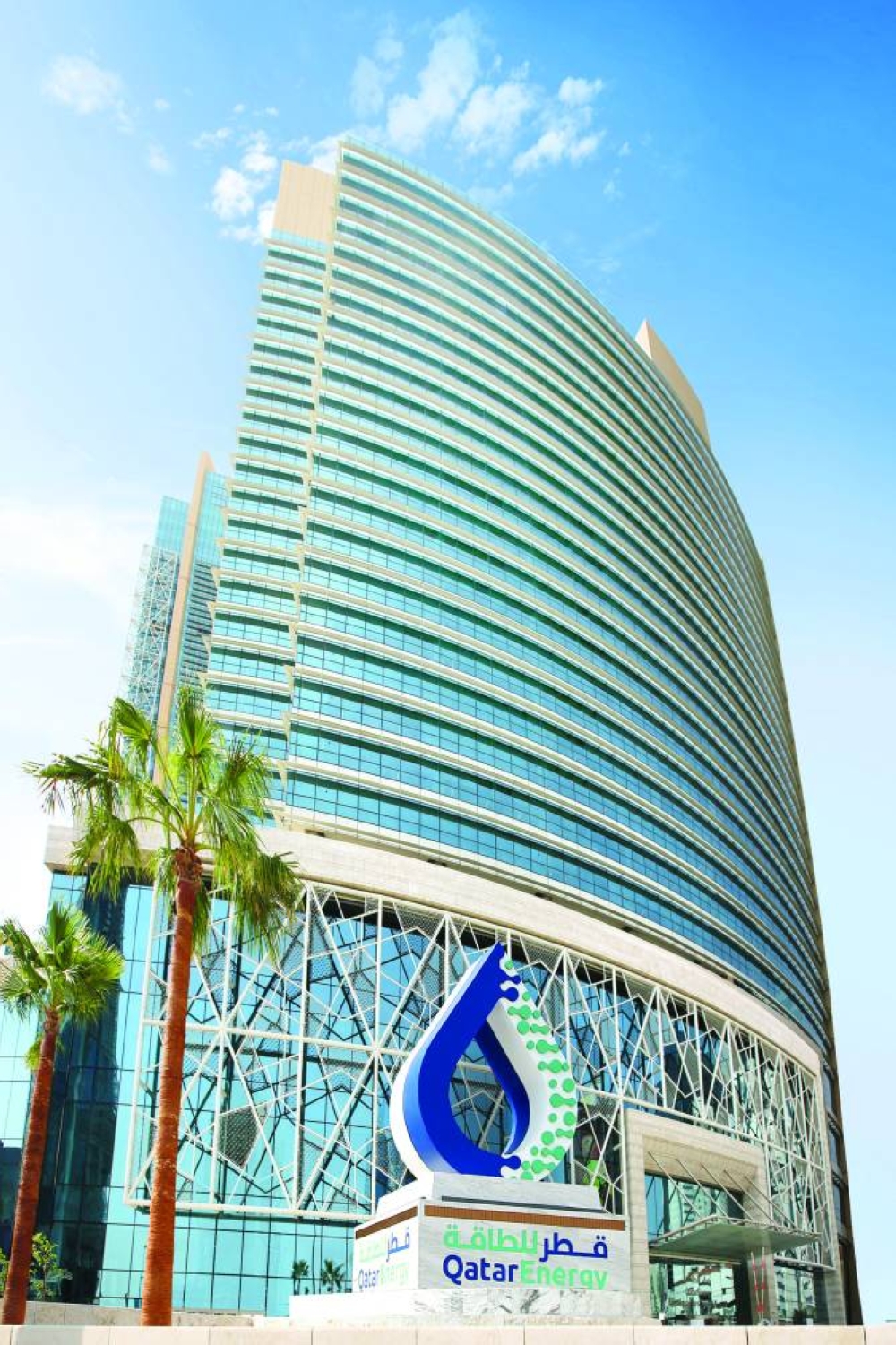Qatar’s energy sector saw a quantum leap in October this year when His Highness the Amir Sheikh Tamim bin Hamad al-Thani laid the foundation stone of the North Field expansion project, which will raise the country’s LNG production capacity from the current 77mn tonnes per year (mtpy) to 126mtpy by 2026.
The project includes six mega trains, each with a production capacity of 8mtpy of liquefied natural gas, four of which are part of the North Field East expansion project, and two part of the North Field South expansion project, contributing a total of 48mtpy to the global LNG supplies.
QatarEnergy is partnered in this global project by TotalEnergies, Shell, ConocoPhillips, ExxonMobil, Eni, Sinopec, and CNPC, whose contributions will play a pivotal role in ensuring the project’s success and achieving its goals by producing LNG that is the best in the world in terms of safety, reliability, and carbon footprint.
In addition to LNG, the project will produce 6,500 tonnes per day of ethane gas, which will be used as a feedstock in the local petrochemical industries.
The project will also produce about 200,000 barrels per day of liquefied petroleum gas (propane and butane), and about 450,000 barrels per day of condensates, in addition to large quantities of helium and pure sulphur.
Speaking at the ground breaking ceremony, HE the Minister of State for Energy Affairs, Saad bin Sherida al-Kaabi, said: “On the local level, this project will have short- and long-term impacts that will be reflected across all sectors of the Qatari economy and will significantly enhance the country’s revenues.
“This major expansion comes at a crucial time, as natural gas occupies a pivotal position in the energy mix in a world facing geopolitical turbulences and is in dire need of clean energy sources that are in line with the global environmental goals.”
In October, QatarEnergy signed the following agreements with Eni, Shell and TotalEnergies.
Affiliates of QatarEnergy and Eni signed a long-term LNG sale and purchase agreement (SPA) for the supply of up to 1mn tonnes per year of LNG from Qatar to Italy.
Affiliates of QatarEnergy and Shell signed two long-term LNG sale and purchase agreements (SPAs) for the supply of up to 3.5mtpy of LNG from Qatar to the Netherlands.
Affiliates of QatarEnergy and TotalEnergies signed two long-term LNG sale and purchase agreements (SPAs) for the supply of up to 3.5mn tonnes per annum of LNG from Qatar to France.
In the same month, QatarEnergy was awarded a new exploration block offshore the Arab Republic of Egypt as part of the 2022 EGAS International Bid Round.
In September, Qatargas changed its name to ‘QatarEnergy LNG’, emphasising a future vision for Qatar’s liquefied natural gas (LNG) industry.
With a new name and logo, QatarEnergy LNG will continue to deliver on its commitment to safety, environmental protection, flawless project delivery and the reliability and efficiency of its production facilities.
The landmark came as part of the increasing international recognition of Qatar’s role in meeting the world's growing need for energy, particularly natural gas – the cleanest of all fossil fuels.
It also reflects QatarEnergy’s continued commitment to LNG as a critical source of energy for decades to come and a vital enabler of the energy transition.
Earlier this month, QatarEnergy announced the successful integration of all marketing and marketing-related activities formerly managed by QatarEnergy LNG.
This is a major move towards consolidating QatarEnergy’s position as a global energy leader and an important milestone to enhance the effectiveness of LNG marketing and sales from Qatar.
In November, QatarEnergy LNG delivered the 1,000th LNG shipment to the South Hook LNG Terminal at Milford Haven in the United Kingdom.
The landmark delivery was made by the Q-Max LNG carrier ‘Mozah’, which already has another landmark achievement to its name: the 10,000th LNG cargo from Ras Laffan Port in 2006.
In October, QatarEnergy and Chevron Phillips Chemical Company (CPChem) announced they have secured $4.4bn financing for the Ras Laffan Petrochemicals project, a world scale integrated polymers complex in Ras Laffan Industrial City, Qatar.
The senior debt financing package is comprised of commercial and Islamic facilities as well as Export Credit Agency (ECA) financing.
The Ras Laffan Petrochemicals project is a joint venture between QatarEnergy (70%) and CPChem (30%) and is considered the largest petrochemical project in Qatar for which Final Investment Decision (FID) was announced in January this year.
In September, QatarEnergy signed an agreement with South Korea’s HD Hyundai Heavy Industries (HHI) for the construction of some 17 ultra-modern LNG carriers.
The deal, valued at QR14.2bn, marks the start of the second phase of QatarEnergy's LNG ship acquisition program, which will support its expanding LNG production capacity from the North Field LNG expansion and Golden Pass LNG export projects as well as its long-term fleet replacement requirements.
Together with the 60 ships that were contracted for by QatarEnergy in the first phase of the programme, which will be built at Korean and Chinese shipyards, the agreement brings the total number of confirmed new LNG vessels to be delivered to QatarEnergy and its affiliates to 77, with more to follow.
It was announced in July that Qatar will host the 21st International Conference & Exhibition on Liquefied Natural Gas “LNG 2026”, a preeminent world event in the LNG industry that showcases the continued growth and development of the sector worldwide.
The hosting of this unique platform for the global LNG industry will coincide with the historic start-up of the North Field LNG expansion project and the commissioning of one of the largest Carbon Capture and Storage schemes in the world by Qatar - the world’s largest LNG producer.
In June, QatarEnergy signed definitive agreements with China National Petroleum Corporation (CNPC), covering the long-term supply of LNG to China and partnership in the North Field East LNG expansion project (NFE).
The two parties signed an LNG Sales and Purchase Agreement (SPA) for the delivery of 4mn tons of LNG per year from the NFE project to CNPC’s receiving terminals in China over a span of 27 years, marking the industry’s longest term SPA commitment.
QatarEnergy celebrated (in June this year) the steel cutting of the first of its new generation of chartered LNG vessels to be constructed in a South Korean shipyard.
Building upon an already successful global maritime initiative, QatarEnergy joined Samsung Heavy Industries, and JP Morgan Asset Management in a special ceremony on Geoje Island in South Korea to celebrate this milestone, which is part of QatarEnergy’s historic LNG Fleet Expansion Project.
In the same month, QatarEnergy’s LNG trading arm, QatarEnergy Trading, entered into a long-term LNG Sale and Purchase Agreement (SPA) with Bangladesh Oil, Gas and Mineral Corporation (Petrobangla) to supply about 1.8mn tons per year (MTPY) of LNG to Bangladesh for 15 years, starting in 2026.
QatarEnergy entered into a farm-in agreement with ExxonMobil Canada in March this year for two exploration licenses offshore the province of Newfoundland and Labrador in Canada.
Pursuant to the agreement, QatarEnergy holds a 28% working interest in license EL 1167, where the Gale exploration well and associated activities are planned.
ExxonMobil Canada (operator) holds 50% while Cenovus Energy holds 22%. QatarEnergy also holds a 40% working interest in license EL 1162, while ExxonMobil Canada (operator) holds the remaining 60%.
In March, QatarEnergy and Chevron Phillips Chemical Company (CPChem) marked the ground breaking of the Golden Triangle Polymers Plant in Orange County, in the US State of Texas, marking the beginning of construction of the $8.5bn world-scale petrochemical facility.
In the same month, QatarEnergy announced a light oil discovery in the Jonker-1X deep-water exploration well drilled in the PEL-39 Exploration License, offshore Namibia.
Business
North Field expansion project - a quantum leap in leadership of Qatar's global energy landscape
Year-end review

In November this year, QatarEnergy LNG delivered the 1,000th LNG shipment to the South Hook LNG Terminal at Milford Haven in the United Kingdom. The landmark delivery was made by the Q-Max LNG carrier ‘Mozah’, which already has another landmark achievement to its name: the 10,000th LNG cargo from Ras Laffan Port in 2006.

Qatar’s energy sector saw a quantum leap in October this year when His Highness the Amir Sheikh Tamim bin Hamad al-Thani laid the foundation stone of the North Field expansion project, which will raise the country’s LNG production capacity from the current 77mtpy to 126mtpy by 2026.

